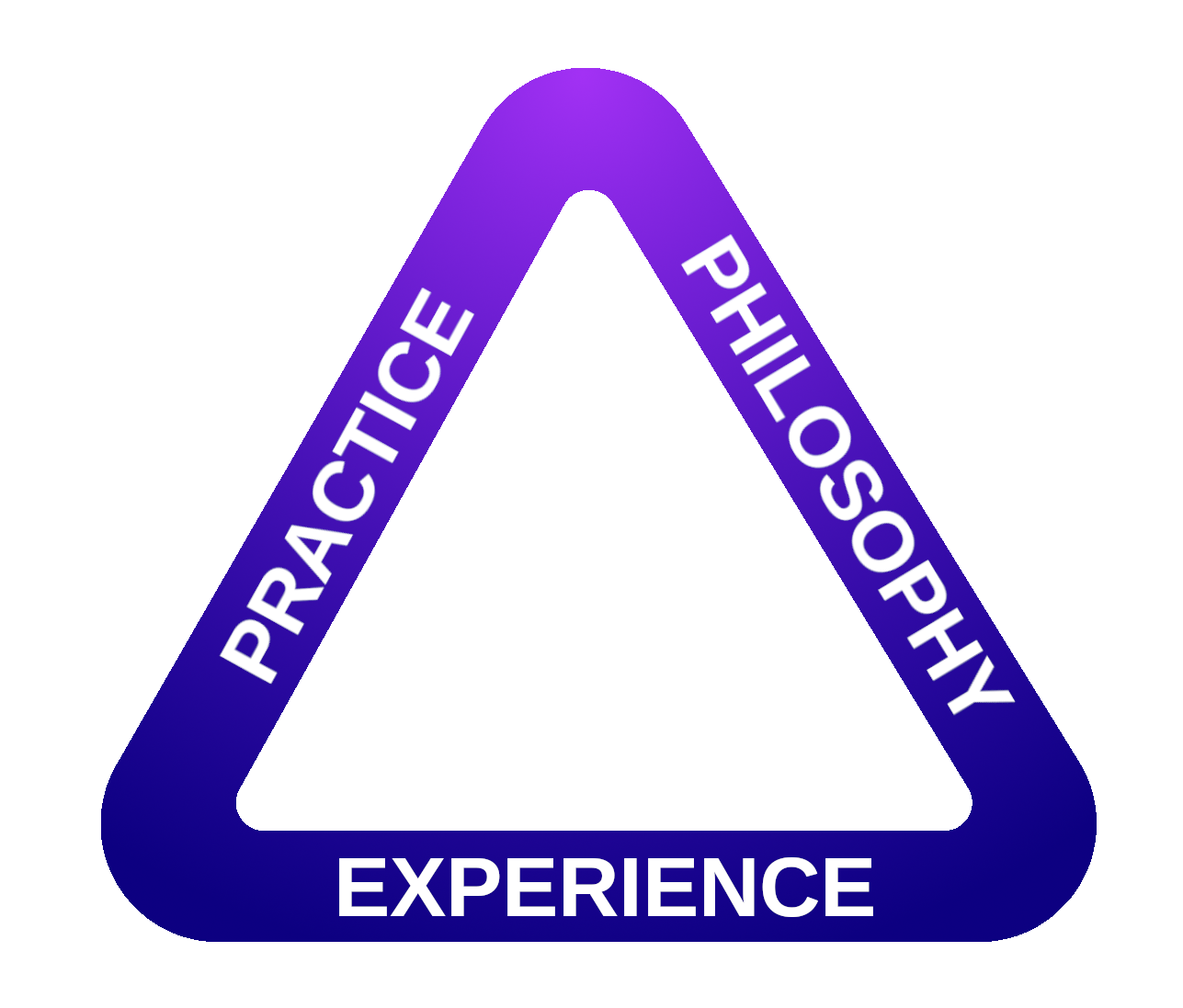A Comprehensive Approach To Awakening
How can we make sure we have everything we need for Awakening without wasting precious time and focus on things that aren't necessary?
Table of Contents
Let's put together a simple, but comprehensive approach to the process of awakening. It sounds ambitious, but trust me, by the end of this article you'll have a solid start to understanding and applying the Way of Awakening to your life.
I'm naturally a systems thinker. Since my early 20s I've had the ability to focus on the smallest details of a subject until I learned it at it's root level, and then switch to "big picture" applications and principles at work within the entire system.
In this article we'll cover the entire Way of Awakening from two levels, first listing the themes in the Way of Awakening (there are 3) and then take a deep-dive into the first one, Experience.
Let's get started!
The Three Themes Of The Way of Awakening
Everything I share in the Way of Awakening will fit into one of these three themes, and I encourage you to categorize everything you study and observe along your own path into one of these three, to create your own approach to Awakening, personalized for just you.

Experience
Experience is the foundation of Awakening.
Every tradition that has Awakening as a central practice all state that Awakening itself is an Experience.
Awakening isn't a state. Awakening is "Seeing clearly what you are, which is fundamental reality."
Seeing fundamental reality in such a clear way alters the way you see yourself and others, and changes your relationship to everything in your life, from yourself, to others, to problems, to your most difficult wounds and fears.
This Seeing is an Experience.
Every step along the Way of Awakening is an Experience.
You can read more about the role of Experience in the Way of Awakening in my article on Belief Systems and Life Mastery: Unlocking Lasting Change
Philosophy
Philosophy is the way we view and interpret what we experience.
It's important to examine our philosophy, because bad philosophy will lead to misunderstanding our experiences.
For example, our ancestors had the experience of performing rituals, like ceremonies and sacrifices, combined with good harvests. Their "philosophy" developed to believe gods controlled events like harvests and would be pleased by ceremonies and sacrifices.
While it's easy to see the fallacies in an ancient culture's belief system, it's much harder to see our own.
Philosophy is where we put:
- Beliefs - things we believe to be true without any direct experience as the foundation for the belief. All religions have systems of belief in them. An example of something that wouldn't be a belief is believing that the sun will come up tomorrow. By convention we may say "I believe the sun will rise tomorrow," but we have this conclusion based in our experience of seeing it consistently rise every morning since we've been alive, and the accounts of thousands of years of history attesting to the same. As a general rule, I avoid beliefs, and spend quite a bit of time in the beginning of the Way of Awakening pointing out how beliefs are actually harmful to making progress towards Awakening.
- Frameworks - ways of explaining and understanding what we observe through experience. Frameworks are like maps - you can use them to see where you are in relationship to other things. For example, a framework that explains how we grow. We could use that to then understand what our next step for growth is, or what we should be doing to continue to grow.
- Views / Approaches - these are similar to frameworks but where a framework may be a series of steps, or a "map," a view/approach is more a single direction, and attitude. For example, we may "view" others through the lens of compassion, or "approach" our difficulties with patience and and attitude of seeking understanding.
Practice
Practices are the things we do to gain Experiences that help us on the Way of Awakening.
All practices fall into three categories:
- Examination - closely examining our experiences.
- Improvement - increasing our ability to more closely examine our experiences.
- Regulation - gaining and improving the ability to regulate our emotional and mental states to first live a balanced, happy life, and second to facilitate improvement and examination.
How Experience, Philosophy, and Practice Work Together
Everything is grounded in our Experience. If we have a Philosophy that is helpful, our Experiences will confirm it and the Philosophy will inform our Practice, telling us what to do or not do.
Philosophy that isn't helpful, or worse, detrimental to our Way of Awakening, will be uncovered by a good Practice, which examines our Experiences and compares them with our Philosophy.
Practices that aren't beneficial to Awakening will produce either unhelpful or inconsistent Experiences, which we will naturally lead us to eliminate them from our Practices in the Way of Awakening.
Notice what doesn't change: Experiences.
Our Practices and Philosophy gets adjusted by our Experience. We understand our Experiences by good Philosophy. We gain valuable Experiences by good Practice.
But Experiences are immovable.
Returning to that example of ancient cultures that used sacrifices to gods to get good harvests, here's how that fits into these three categories:
- Experience: good and bad harvests.
- Philosophy: a ritual would produce good harvests.
- Practice: perform the rituals.
The Experience of harvest didn't depend on the rituals, it was directly related to the weather, which wasn't controlled by a god who was influenced by their ritual.
So when they performed the ritual, sometimes they had a good Experience (good crop) or a bad Experience (bad crop).
Since the Experience of crops being both good and bad, regardless of their Practice, wasn't changing, the Philosophy and Practice needed to change.
And over time, it did.
Avoiding Useless and Harmful Practices and Philosophies
Useless Practices waste our time with things that don't actually advance us on the Way of Awakening.
Useless Philosophies tie up our attention and can set us back years by chasing ideas that aren't aligned with ultimate reality.
Some practices (like washing your hands before you eat) are beneficial, but have nothing to do with Awakening, and some philosophies are the same, like your working knowledge of how to drive.
Let me be clear, I'm not lumping those into this category of "Useless and Harmful Practices and Philosophies."
I'm only addressing those Practices and Philosophies we have regarding our Way of Awakening which work against our progress.
Experiences are slightly different in this regard.
While we can examine every Experience we have and align each with a specific Philosophy and Practice, it's not practical, nor necessary.
For example, it may be beneficial to spend a meal eating mindfully, fully examining the entire Experience of eating your food, like the taste and texture of every single bite, including the sensations of your jaw muscles with each chew and the movement of food as you swallow it.
But it would be impractical to eat every meal like this.
If you have an Experience you'd like to eliminate, like constant conflict with a particular person, you can't change your Experience, but you can change your Practice in engaging (or avoiding) that person.
Note: Because the limitation of language, we can say you can change the Experience you have with that particular person, by changing your relationship with them and/or eliminating your likes/dislikes related to them. In this way you'd change the way you Experience that person. But for the purpose of our conversation, I say Experiences can't be changed in the sense that they are factual occurrences, prior to our interpretations of them. The interpretations can be changed, the Experience itself can't be.
A Philosophy that doesn't help us better understand our Experiences or inform us of good Practices aren't needed.
Likewise, Practices that don't come from good Philosophy or give Experiences that are useful on the Way of Awakening can be eliminated.
Using the example again of the society that had a ritualistic practice for good crops, imagine if they examined their Philosophy that there was a good that would be pleased by their (Practice) ritual and give them a good harvest (Experience).
It would only take a couple seasons of their Experience not matching up with the Philosophy and Practice to warrant a change.
Unfortunately, because they also had a Philosophy of superstition, they would (and did) create more and more complex Philosophies to explain why not every Experience aligned with the simpler Philosophy of the harvest god and rituals.
So let's address simple Philosophy next.
Prefer Simpler Philosophy
Notice the direction our example culture went with their Philosophy when they were confronted with Experiences that weren't in alignment on with their Philosophy.
They would develop more complex systems of Belief.
Our observation, after thousands of years of advancement (especially accelerated since the Enlightenment), has lead us to simpler and simpler Philosophies.
Every day something is added.
In the practice of the Tao,
Every day something is dropped.
- Lao Tzu
My direct experience is that reality is simpler than I had ever imagined it, and that the simplest explanations were further along the path than my more complicated versions.
My recommendation, when faced with a Philosophy that isn't lining up with Experience, no Philosophy is better than a more complex one.
In Zen they have a concept of "Don't Know Mind," also called "Beginner Mind."
Don't Know Mind is an Attitude we adopt when we come to something we can't explain. It's much better to just "sit with Don't Know Mind" (as the Zen teachers would say) than to keep making erroneous Philosophies that we'd have to undo later.
In my next article I'll present a starting place for Philosophy - just two frameworks through which you can view everything on you Way of Awakeing.
I'll also present a case for eliminating everything else but these to frameworks, and how as you grow you add to your own Philosophies based on your Experience on the Way of Awakening.
Until then, be well my friend!
- omni pada
